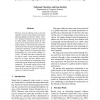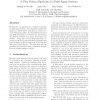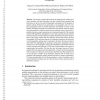9 search results - page 1 / 2 » Jointly Combining Implicit Constraints Improves Temporal Ord... |
EMNLP
2008
13 years 6 months ago
2008
Previous work on ordering events in text has typically focused on local pairwise decisions, ignoring globally inconsistent labels. However, temporal ordering is the type of domain...
CVPR
2009
IEEE
14 years 11 months ago
2009
IEEE
Contemporary face recognition algorithms rely on precise
localization of keypoints (corner of eye, nose etc.). Unfortunately,
finding keypoints reliably and accurately remains
a...
ATAL
2007
Springer
13 years 10 months ago
2007
Springer
Decentralized Markov Decision Processes (DEC-MDPs) are a popular model of agent-coordination problems in domains with uncertainty and time constraints but very difficult to solve...
CL
2000
Springer
13 years 9 months ago
2000
Springer
We introduce an algorithm for cooperative planning in multi-agent systems. The algorithm enables the agents to combine (fuse) their plans in order to increase their joint profits...
CONSTRAINTS
2010
13 years 4 months ago
2010
Abstract. We describe a simple CSP formalism for handling multi-attribute preference problems with hard constraints, one that combines hard constraints and preferences so the two a...




